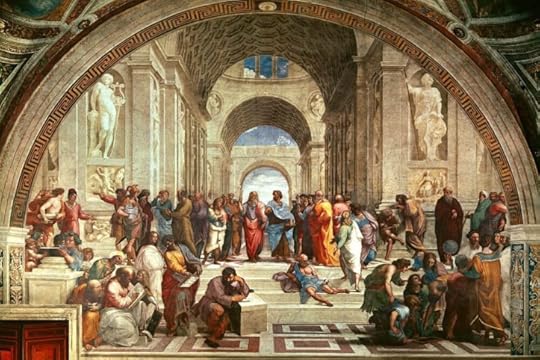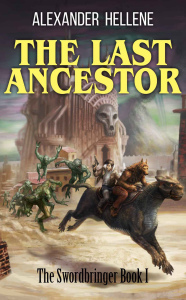Lessons from a Master: What Reading Dan Simmons is Teaching Me

I’m three-quarters through The Fall of Hyperion by Dan Simmons–sequel to Hyperion and book 2 in the 4 book Hyperion Cantos series–and I can’t stop singing these books’ praises. I think so far I’ve convinced over ten people to give Hyperion a shot.
[image error]
It has been a long time since I’ve found a novel or series that has engrossed me to this degree, particularly a sci-fi novel. I read mostly fantasy and thrillers/horror, and only reignited my love for sci-fi in the past five or six years. Simmons’ writing has been keeping me up at night, and I’ve even been having dreams about the worlds he’s created. What’s more, upon going to a new chapter or scene, I am yet to say to myself “Oh God, not this boring bunch of clowns.” Every single character, point of view, and setting is enthralling.
The breadth of Simmons’ imagination and his staggering skill as a writer are undeniable, and bound to leave an impression. In thinking about these books as much as I have, I tried to crystallize exactly why The Hyperion Cantos are scratching an itch in such a way I haven’t experienced since I read Frank Herbert’s six-book Dune series some eight years ago.
Tone. Simmons writes like an adult, and it shows. The stakes facing the Hegemony of Man are high, the tension is palpable, and there is a constant sense of urgency. And yet despite this intense premise, the action, and the political machinations of the various factions, the books so far have never delved into the realms of nihilism and gray despair. There are different characters and different groups with conflicting interests and worldviews, but they’re all presented logically and, at the end of the day, you get the sense that the protagonists are struggling for a positive outcome.
Lesson: Snark is nearly instantly dated. Maturity is timeless. And conflict and GSU (Goals + Stakes + Urgency) are what propels a story, not the clever snappiness of your dialogue or how many F-bombs you can sneak in there.
Characters. There are so many unique characters in these books, and Simmons has given each of them life. Each one behaves like an actual human being, and even when they make poor decisions, it is because of flaws in their worldview, the exigency of their situation, or their lack of adequate information and never for plot reasons. Further, Simmons never devolves his dialogue or narration into TV sitcom-level snark like in much modern fiction. The only real snarkbuckler, the poet Martin Silenus, is presented as an obnoxious and selfish jerk, not the Joss Whedon-esque totally super-smart and funny hero the way such characters are portrayed in the hands of lesser men. And yet, due to Simmons’ superlative skill, even Silenus is a sympathetic and likeable character. Truly astounding.
Lesson: Your characters don’t each need “a flaw.” What they each need is to be distinct from each other with their own motivations and goals.

Understandable. Like I wrote in my review of Hyperion, the story is diegetic, meaning that we see an interior view of the story where details about the world are revealed by the characters and not by the narrator. The Hyperion Cantos feature tons of sci-fi elements, like farcaster portals (i.e., instantaneous interstellar travel), faster-than-light travel via hawking drives, time debt incurred due to interstellar travel, and lots other time-travel elements. There are humans who evolved differently, high technology, independent and near omniscient AIs, unfathomably deadly weapons, Time Tombs . . . and somehow Simmons makes it all understandable.
Lesson: Your worldbuilding matters only insofar as it pertains to the story and your readers know what the hell is going on. Otherwise, nobody cares about your uber-detailed magic system.
Imagination. The Hyperion Cantos are serious works. They tackle philosophy, politics, war, and religion in mature, heavy, and always respectful and interesting ways. Yet the scope of Simmons’ imagination is stunning, and really sets these books apart from the “despair is realistic” crowd. Houses and government buildings where each room is on a different world thanks to farcasters . . . a sailing ship required to travel across an ocean-sized sea of grass . . . planets of giant trees, of endless seas, reconstructions of Earth cities or eras, where high gravity makes its citizens shorter, stocky, and strong . . . a colony of poets on a dangerous, distant world . . . the recreated consciousness of dead poets created by AIs and put into organic human bodies . . . humans who have evolved into human-animal hybrids . . . there is so much here, even little things, that make you realize Simmons has created a vision of the future that feels right out of some pulpy astonishing tales while remaining realistic enough to seem lived-in and, dare I say it, plausible.
Lesson: A mature, heavy, deep work does not by default have to skimp in the imagination and wonder departments. In fact, these two things help.
Sex. There are some relatively explicit sex scenes in Hyperion (I haven’t encountered any in The Fall of Hyperion). However, I did not find them gross or objectionable, even though I’m not generally a fan of such things in novels. First, they are neither gratuitous nor titillating. Second, they actually matter to the story (two characters in particular; I will say no more to avoid spoilers). Third, Simmions writes about sex, sexuality, and relationships in general like a grown man who has had deep, meaningful relationsihps and sex with actual women. I’m not trying to be flippant here; I’ve read quite a bit of just awful sex and romance stuff from big name published authors (I keep coming back to this book, but good Lord some of it is so, so awkward and bad) that Simmons’ handling of these topics sticks out like a beacon of light. In The Hyperion Cantos, the sex is never crude or vulgar.
Lesson: Sex sells . . . but sex can detract. Unless you have a really deft hand at it, avoid the explicit stuff.
Respect. Simmions writes about philosophy and religion in the way that they have been a part of human existence until fairly recently. In other words, people need some kind of overarching belief system, whether religious or secular, that is coherent and informs how they act and react to the world around them and their fellow man. Christianity exists as a nearly forgotten sect, and several of the main characters are Catholic priests. Islam also exists, as to Jews, although Judaism hasn’t been too present as a currently practiced faith, although Jewish history and Old Testament stories factor heavily in the narrative. Simmons has also made up his own religions that exist in this fictional world some 800 years into the future, and they’re utterly fascinating. There is the Shrike Cult, aka The Church of the Final Atonement; Zen Gnosticism; and my favorite, the Order of the Templars who live on the tree-covered world of God’s Grove, fly starships made from unfathomably large trees, and believe that mankind must be in harmony with nature. Although various factions disagree, and various characters disagree with various factions, Simmons never takes lame, faux-edgy, immersion-breaking potshots at any faith or philosophical bent. Contrast that with, once again, this book.
Lesson: If you want your characters and worlds to appear real, they have to have hallmarks of humanity. These include–like it or not, edgelords–religion as well as philosophy. And the best way to create this depth and believability is to not use your fiction a mask for your own prejudices against this worldview or that faith.
Dan Simmons is a master, these books are great, and I hope I explained exactly why I find that The Hyperion Cantos are so satisfying to me. These are the lessons I strive mightily to apply to my own writing. Sometimes the best way to improve your own craft is to read.
I do my best to put the lessons I learn from the masters into practice. Check out The Last Ancestor to see my praxis (how’s that for a fancy word?).

And the IndieGoGo crowdfunding campaign for Dreamers and Misfits is still going strong–contribute here!




